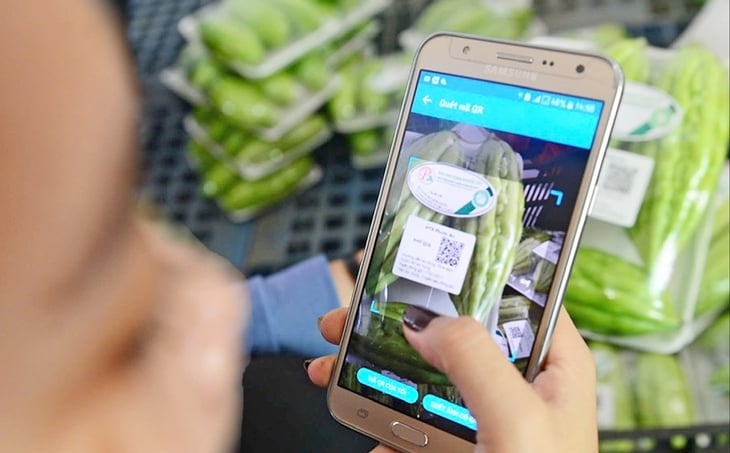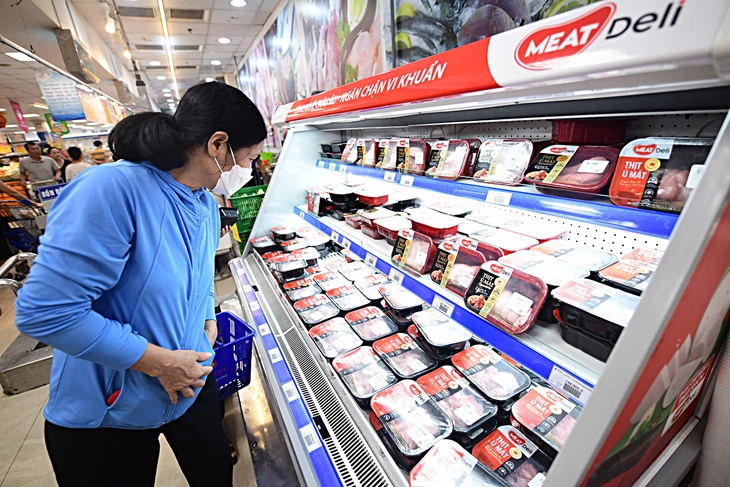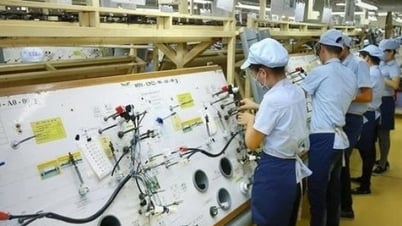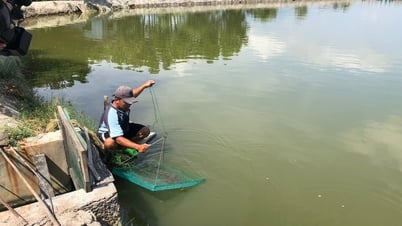
People are tracing the origin of consumer products before purchasing - Photo: QUANG DINH
Stories about vegetable candy, fake milk, and "rejuvenating" functional foods recently have made many people confused when they want to buy a new product.
When influencer endorsements and even product labeling are no longer reliable, technology is expected to be the most effective solution.
Need to apply traceability technology
Since the Kera vegetable candy production line and the case of nearly 600 types of fake milk were exposed, Ms. Thu Nga (Binh Thanh District, Ho Chi Minh City) has always been skeptical when choosing to buy any product.
"In the past, I always had the habit of reading the information carefully and checking the expiration date when I intended to buy any product. But after the recent incidents, I kept wondering if the published information was correct. Is there any other way for me to check and feel secure about the product I am about to buy and use?", Ms. Nga asked.
This is also a common concern of many consumers after recent incidents involving counterfeit and poor quality goods were exposed.
At the workshop "Tracing the origin of products and goods in national digital transformation", recently held in Ho Chi Minh City, Dr. Trinh Ba Duong, Chairman of the Trade Promotion Alliance of Southeast Asian countries (AseanHub), said that the situation of counterfeit goods is increasingly sophisticated and complicated, becoming a direct threat to consumer health, business interests and national reputation in the global supply chain.
"Counterfeiting is not only copying designs, but also counterfeiting information, data and traceability codes. Traditional methods - simple labels and barcodes - are no longer enough to deal with sophisticated tricks, are showing many shortcomings, are easily counterfeited, remade, and even QR codes are counterfeited" - Mr. Duong said, and believes that truly breakthrough solutions are needed, based on integrating smart technology and linking digital data chains.
In fact, Vietnam has many ways to confirm the origin and quality of products as well as measures to trace the origin of products. Tracing the origin of goods is no longer a strange phrase, it is mentioned frequently in people's lives and activities because it is directly related to the safety of each individual using the product, as well as the survival of legitimate businesses and the safety of the national economy.
Furthermore, in the context of economic integration and increasing demands for product information transparency, traceability has become an inevitable trend in the global supply chain. Many countries and regions have regulations on tracing the origin of goods to serve the purpose of tax imposition.
For Vietnam, in order for products to maintain their position and develop new markets, traceability plays a very important role.
Chip the product!
Lawyer Pham Van Tho, Chairman of the Board of Directors and General Director of Vietnam Anti-Counterfeiting Technology Joint Stock Company (Activ), said that the problem of goods of unknown origin in traditional markets and e-commerce platforms has caused many businesses and consumers to suffer.
Meanwhile, businesses that want to expand into the big ocean must meet the market's strict demands on quality, design, price... if they do not want consumers to turn their backs on their products.
According to Mr. Tho, one of the solutions to trace the origin of products and goods using advanced technology is to attach RFID (Radio Frequency Identification) chips to the products.
Each RFID chip carries a unique identification code, storing information on production and business stages including: product traceability code, location traceability code, event time of each stage...
"Attaching chips right from the production stage will prevent counterfeiting and imitation of products, as well as easily trace the origin of the product," said Mr. Tho.
Meanwhile, according to Dr. Duong, the combination of three technologies RFID - blockchain - AI (artificial intelligence) will provide the best solution as well as the ability to be practically deployed on a large scale for identifying and tracing the origin of products.
In addition to the RFID chip, the blockchain is where all the data from the RFID is stored - creating a distributed, immutable and transparent ledger. Every update, every step of the operation - from production, packaging, to circulation - is recorded. Consumers or regulatory agencies can check the entire product journey with just a simple "scan", and most importantly, no one can interfere or modify that information.
Meanwhile, AI plays a role in analyzing data collected from RFID and blockchain systems. AI can detect abnormalities, warn of risks, and support businesses in making quick decisions. AI can even predict the possibility of fraud or supply chain disruption through machine learning and behavioral recognition algorithms...
"The combination of these three technologies creates an accurate, transparent and automated traceability system that is capable of dealing with all forms of modern counterfeiting. Not only limited to consumer products, this system can be deployed in areas such as healthcare, pharmaceuticals, agricultural products, logistics, seafood and even cross-border e-commerce," said Mr. Duong.
Need a national strategy
Dr. Trinh Ba Duong said that Vietnam needs a national strategy on smart traceability, focusing on three points.
The first is to integrate new technologies - especially RFID, blockchain and AI - into a unified system architecture, connecting data from central to local levels, from large enterprises to small producers.
The second is to standardize data and national code and barcode infrastructure, which can be linked with ASEAN regional platforms, promoting exports and cross-border digital trade to help circulate goods among countries in the region most effectively.
Third is to support businesses in digital transformation, especially small and medium enterprises, with low-cost, accessible solutions, accompanied by specific incentive policies.
"If we consider technology as the key, traceability must be the door to open a transparent, civilized and sustainable trade. This is not just a technical issue but a foundation to protect people, support businesses and elevate the country in the digital economy," Mr. Duong proposed.
Using technology to standardize processes and increase transparency in traceability

Experts propose... attaching chips to products to trace their origin and prevent counterfeit and poor quality goods - Photo: Q.DINH
Speaking with Tuoi Tre, Mr. Nguyen Huy, General Director of Phygital Labs Technology Company, said that the application of new technologies such as blockchain, IoT, AI, NFC/RFID smart stamps... can help standardize processes and increase transparency in solving the problem of traceability.
In Vietnam, some blockchain application solutions have also emerged. However, to be effective, these blockchain-based access platforms do not stop at "internal access" but aim to connect data authentication capabilities according to common standards, ready to demonstrate transparency to all partners from domestic to international.
"This requires a common strategy in building and integrating overall traceability data. Data sharing and connection between industries and localities, from suppliers, manufacturers to distributors on a common data platform and standards," Mr. Huy proposed.
Many countries have applied new technology.
Mr. Rin Thamaiah, Chairman of T-Solution Technology Group (India), said that in India there are many mobile applications for tracing the origin and ensuring the quality of goods.
"In particular, recently we have applied new technological solutions to combat counterfeiting using digital technology or using AI and blockchain to combat counterfeiting. These are very effective integrated technology solutions that can monitor in real time and prevent information fraud," said Mr. Rin Thamaiah.
Thailand has also begun using RFID and blockchain to export durian to China, helping to track the entire journey of the fruit from the orchard to the border gate. Singapore is deploying an AI platform to monitor the quality of medicines and dietary supplements.
Vietnam also has a number of pioneering enterprises in the pharmaceutical and agricultural industries applying RFID and digital traceability, but their scale is still small and lacks regional and industry linkages.
Source: https://tuoitre.vn/gan-chip-de-chan-hang-gia-hang-nhai-20250421232732282.htm



![[Photo] Prime Minister Pham Minh Chinh receives Swedish Minister of International Development Cooperation and Foreign Trade](https://vphoto.vietnam.vn/thumb/1200x675/vietnam/resource/IMAGE/2025/5/12/ae50d0bb57584fd1bbe1cd77d9ad6d97)
![[Photo] Prime Minister Pham Minh Chinh works with the Standing Committee of Thai Binh Provincial Party Committee](https://vphoto.vietnam.vn/thumb/1200x675/vietnam/resource/IMAGE/2025/5/12/f514ab990c544e05a446f77bba59c7d1)


![[Photo] Prime Minister Pham Minh Chinh starts construction of vital highway through Thai Binh and Nam Dinh](https://vphoto.vietnam.vn/thumb/1200x675/vietnam/resource/IMAGE/2025/5/12/52d98584ccea4c8dbf7c7f7484433af5)

















































































Comment (0)